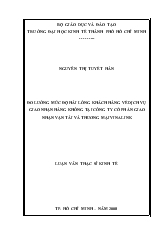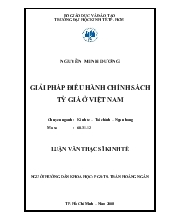Optimality conditions for vector equilibrium problems in terms of contingent derivatives
- Người chia sẻ : vtlong
- Số trang : 26 trang
- Lượt xem : 27
- Lượt tải : 500
- Tất cả luận văn được sưu tầm từ nhiều nguồn, chúng tôi không chịu trách nhiệm bản quyền nếu bạn sử dụng vào mục đích thương mại
Bạn đang xem trước 20 trang tài liệu Optimality conditions for vector equilibrium problems in terms of contingent derivatives, để xem tài liệu hoàn chỉnh bạn click vào nút DOWNLOAD LUẬN VĂN ở trên
The vector equilibrium problem plays an important role in nonlinear
analysis and has attracted extensive attention in recent years because of
its widely applied areas, see, for example, Anh (2012, 2015), Ansari (2000,
2001a, 2001b, 2002), Bianchi (1996, 1997), Feng-Qiu (2014), Khanh (2013,
2015), Luu (2014a, 2014b, 2014c, 2015, 2016), Su (2017, 2018), Tan (2011,
2012, 2018a, 2018b), etc. The vector equilibrium problem is extended from
the scalar equilibrium problem which was first introduced by Blum-Oettli
(1994) and the optimality condition for its efficient solutions is a main subject which will be needed to study, see, for instance, Luu (2010, 2016, 2017),
Gong (2008, 2010), Long-Huang-Peng (2011), Jim†nez-Novo-Sama (2003,
2009), Li-Zhu-Teo (2012), etc. Our thesis studies the first- and secondorder optimality conditions for vector equilibrium problems in terms of contingent derivatives and epiderivatives in which the conditions of order
one using stable functions and two using arbitrary functions.
The contingent derivative plays a central role in analysis and applied
analysis, and it will be used to establish the optimality conditions. Aubin
(1981) first introduced a concept of a contingent derivative for set-valued
mapping and their applications to express the optimality conditions in
vector optimization problems like Aubin-Ekeland (1984), Corley (1988)
and Luc (1991). Jahn-Rauh (1997) provided a concept of a contingent
epiderivative for set-valued mapping and obtained the respectively optimality conditions. Chen-Jahn (1998) proposed a concept of a general contingent epiderivative for set-valued mapping and the result is applied to the set-valued vector equilibrium problems. In the case of single-valued
optimization problems, we don’t need to move from set-valued results into
single-valued results which establishing the new results are sharper.




